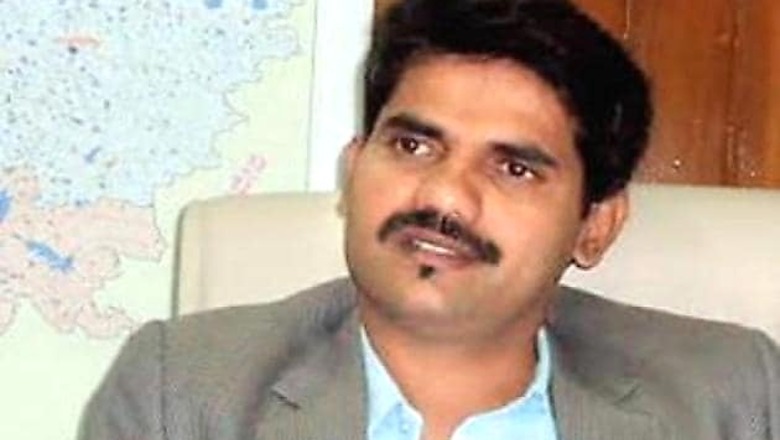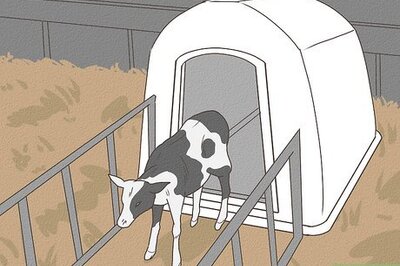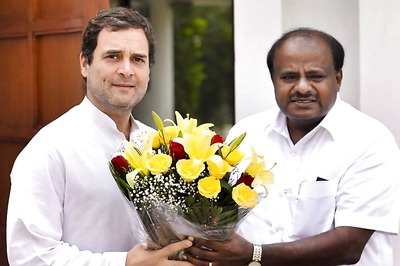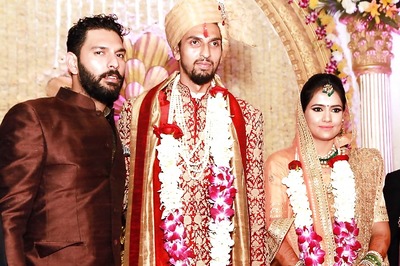
views
He, an honest IAS officer. She, an honest IAS officer. Young. In their thirties. Barely into the fifth year of the Indian Administrative Service. Mates of Batch 2009. There was more. Naturally. He took on the land mafia in Karnataka. He was their scourge. He untiringly tried to unearth tax evasion by them. He was transferred umpteen number of times. As his reward. The public adored him. Of course.
She is credited with constructing 75,000 individual toilets in Mandya district where she is currently posted. Her target is 1.02 lakh toilets in as many households. Under the Swachh Bharat Abhiyan. On March 11, she was selected by the Union government to train fellow IAS officers for effective implementation of her initiative.
Five days later, on March 16, he died. He was found hanging from a fan in his home. The unnatural death threw both of them into a vortex which now threatens to blacken their well-earned official reputations. It has already muddied and muddled their private lives.
When the dust settles down on this case in the near future, as it naturally would, the two officers would be remembered more for their private discretions or indiscretions than their achievements as officers of the Indian Administrative Service. The media and the politicians will be held solely responsible for such an eventuality. Should they be? You judge.
A day after the officer's death there was a clamour for a CBI probe. The opposition parties in Karnataka and the media were exclusively behind the clamour. The state government tried its best to stall it, but eventually gave in.
India's premier investigative agency, the CBI, will now try to find out if the officer's death was unnatural and if so, why so. Which means, on the face of it, the premise that the death could have been a suicide is ruled out. At least in the discourse in the media and social media.
The CBI will try to probe if the officer was killed, suffocated to death or whatever and if so by whom. If it is unsuccessful, it will have no option but to agree with the state police that it was a suicide.
The state government backed its police which from day one was saying it looked like a case of suicide, claiming it has irrefutable evidence to say so. The local CID began a probe that ran into trouble when the lady officer's husband approached the Karnataka high court for a stay on it being made public. It was granted.
That put paid to the state government's plans of tabling the preliminary report of the CID in the state assembly as a counter to the opposition's demand for a CBI probe.
Within hours of the knowledge about the officer's death on May 16, the media advertised the notion that the death was linked to actions he had initiated against certain real estate companies in the last few months. The media extolled his achievements, turning him into a martyr, laying the blame at the feet of certain mafia in Karnataka. The opposition parties took up the cue: the mafia was being protected by the chief minister which was why he was intent on proving the death as a suicide.
An irritant to the media was the state police which kept on insisting that it was a case of suicide. The media simply brushed it aside. It pooh-poohed the government, questioned its integrity and wondered if it was trying to protect the officer's "killers". The media could not name the "killers" for the simple reason that it did not know who the killers were if at all there were. The police may be right or wrong, but then how can a "hero" commit suicide? Such a scenario does not exist in media textbooks on making-and-making-of-heroes. So, as far as the media was concerned, the officer did not commit suicide? And therefore the need for a CBI probe? True or false, certainly the media is not aware which one!
There was another section of the state's population which subscribed to this theory: the opposition parties, specially one particular party. Its leadership wasted no time in jumping on to the CBI-probe band-wagon. It may be a coincidence that both the party's top leader and the dead officer belong to the same caste which is, equally coincidentally, politically against the caste to which the current chief minister belongs.
The leadership's initiative saw the officer's parents, poor fruit sellers who worked all their lives to educate their son, being given no time to grieve for their child; instead they were brought to the state capital and settled right in front of the assembly so they could grieve in public glare for the media cameras to record their grief for the purpose of breaking-news visuals and, of course, posterity.
They were obviously tutored by some one as otherwise they could never have articulated their demand for a CBI probe the way they did. Poor parents, they were apparently told that they would receive crores of rupees from the government and everyone else if it was proved that their son was murdered. Those using them as a shoulder to fight their political battle wanted more publicity for their cause, So, they drafted a letter, an open letter, to Sonia Gandhi, signed by the officer's now-publicly-grieving mother Gowramma and his unidentified friends. Was the letter sent to Sonia Gandhi's office or residence by courier or handed over in person? No. It was sent to the advertisements section of a national English daily for a prominent display in its March 22 Delhi edition. In impeccable English, Gowramma talks to Sonia Gandhi about her travails for justice for dead son, reminding Sonia Gandhi of her own travails in May, 1991.
The media, ever the faithful, "anti-establishmentarian" lap dog, ensured no scene of all this drama was missed out on.
Having settled the "family" campaign, the opposition party began targeting the CID which claimed it was trying to put together a preliminary probe report. In no time, "authoritative sources" started leaking information about private matters relating to the dead officer and living woman officer.
The media exhibited no sense of propriety in naming the woman officer into its cooked-up narrative. It could not justify why it was dragging her name into the story. Yet it did. Ratings matter more than privacy. There were debates on how many WhatsApps and texts and mails were exchanged between the two officers before his unnatural death. Their privacy was butchered at the altar of insensitive journalism as the media debated on the nature of the relationship between the two officers. It was one-sided, it said. The man was in love with the woman, it said. The woman did not reciprocate, it said. They eventually got married though not to themselves, it pointed out. Yet he did not forget her, it said. He was pestering her, it said. She was complaining, it said. The breaking-news went on and on and on. Finally, he committed suicide just after texting her informing her he was taking an extreme step to which she replied in the exclamatory, "no kidding?". Having said all this, the media says in the same breath the CBI should probe the unnatural-which-is-not-a-suicide-death.
A part of this unattributed-yet-authoritative media narrative was that the woman officer had brought her trauma to the notice of a friend who happened to be the advisor of the chief minister of a neighbouring state. The media said the woman officer had also written to the Karnataka chief secretary about the male officer harassing her. The opposition spiced up the narrative by adding that the chief secretary, wanting to secure his future after retirement, was intent on "proving" that it was a failed personal relationship which led to the officer's suicide so as to hide the real reason - the alleged shielding of a real-estate-owning politician by the chief minister - being the unnatural death.
Two critical bits of information the opposition party latched on to, to say that the CID could not probe the affair. One, that the CID has no jurisdiction to record the statement of the chief minister's advisor. Two, the CID has no jurisdiction to record the statement of the state chief secretary. Therefore, the CBI alone can conduct the probe. Sweet logic, tempting enough for the media to launch a national campaign for the probe.
The media and the opposition party continued to denude the two officers of all their privacy. Soon reports began to circulate that the officer's marriage was in doldrums because of his relationship with the woman officer; that they were close to divorce; that his father-in-law was involved to a more-than-necessary extent in his son-in-law's life. It was besides the point that the father-in-law incidentally was overlooked for an election ticket last time by Siddharamaiah. Notwithstanding this coincidence, as claimed by the media, the father-in-law's side also raised the demand for a CBI probe.
As things stand, on the day the state government succumbed to the demand for a CBI probe, let us see which of the interested parties favour which probe:
CID probe: the state government led by its chief minister
CBI probe: the media, the opposition party, the entire social media, the parents of the dead officer, the in-laws of the dead officer (in that order, the order determined by the loudness of their respective demands for the probe).
As things also stand, the officer may have committed suicide, may have done so voluntarily or under coercion or under emotional stress, may have been murdered by suffocating him and then hanging him by the fan, or killed by some other diabolical method.
If he did not kill himself, logic says someone must have been the killer. Who? Everyone is a suspect, including the real estate mafia. Or, some other person whose identity and motive are not currently known or being considered even could have been responsible. Or, maybe a supernatural force ended his life. Or, someone emptied his bedroom of all oxygen, killing him (that still does not explain how he happened to hang by a rope). The point it, it could be anyone, repeat, anyone. In which case, why is the media and the opposition dragging only the lady officer into the public domain? Because there is a truth only the media and opposition party knows as of now? Or because the media and opposition party cannot resist being lascivious?
By the time the CBI completes its probe, one thing would certainly have happened. To repeat myself, in the collective memory of the people of this country, the dead male officer and living woman officer would be remembered more for the tidbits of their private lives prised open by the media and the opposition party than their achievements as IAS officers.
Whither journalism. Wither journalism?
Disclaimer: This article is a personal opinion piece of the author VV Padmanabha Sharma



















Comments
0 comment